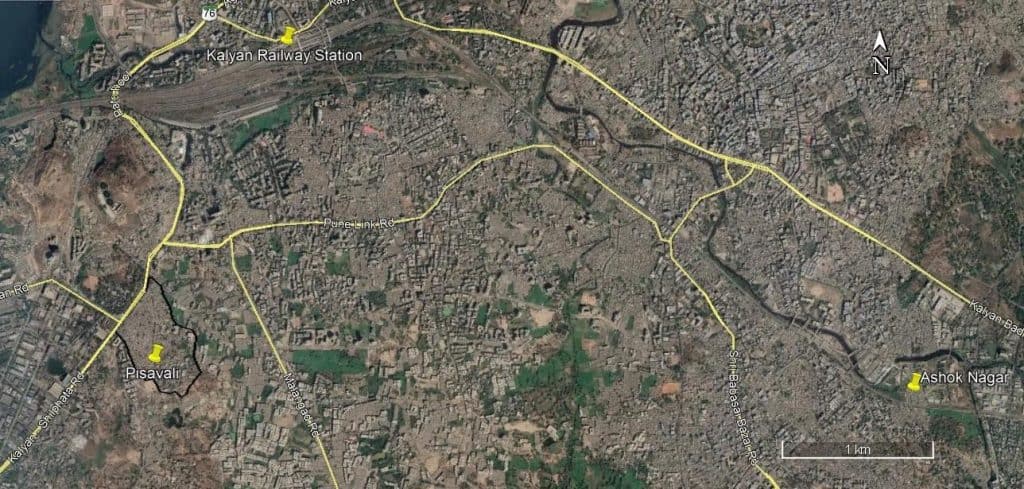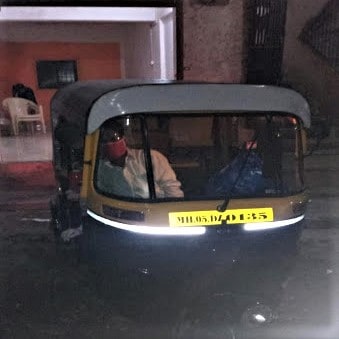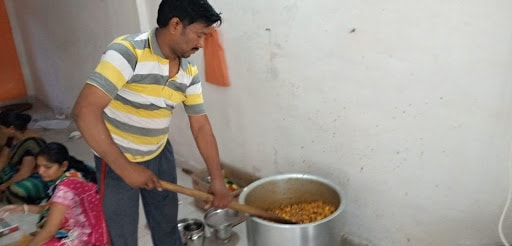Pisavali is a densely populated, low income neighbourhood. Most residents of the low income settlement are working in the informal sector. Many of the temporary residents in the basti are migrants from states of Bihar, Uttar Pradesh and West Bengal without a permanent home in the city. After the sudden declaration of a nationwide lockdown starting on the 24th of March, only a few of the migrants were able to go back to their native villages. The majority however was stranded in Pisavali.

Life became difficult given the precarious nature of employment for residents in Pisavali. Many had lost their livelihoods. But the migrant labourers, who mostly worked as daily wage workers were the most vulnerable ones in the basti. Many of them had not been paid by their contractors since the lockdown began. They had limited access to food supplies and were threatened with eviction by their landlords.
Though the central and the state governments had declared several relief measures it had barely reached the community. A resident of Pisavali observed that people having ration cards did not necessarily get the full quota of rations. The ration shop owners gave only one kilogram of rice per person whereas the government had allotted 5 kg of rice per person. Some unscrupulous shop owners had been charging Rs. 25 to Rs. 30 for one kilogram of rice thus making a neat profit even in the midst of a global pandemic!
Women in the neighbourhood did not get money in their ‘Jan Dhan’ accounts initially and had to queue up in the sun in front of the bank. However, migrants whose ration cards were registered in their native villages, and were rarely politically organised or registered with a workers’ board, could not avail the rations at all. For them, it meant walking in search of an inadequate meal distributed by charity organisations or the State government.
In such a grave situation, it was one of the residents of Pisavali, who came up with a plan to reach out to the distressed migrant community living in Pisavali.
Santosh Kumar works in a showroom and is also a part-time auto driver. He has lived in Pisavali for more than a decade and considers it his home. During the lockdown he observed migrant men going out in the morning and coming back in the evening. After the fifth day, Santosh asked them why they were moving about at the cost of their health and police harassment.
What he heard really shocked him. Most of these people had no food in their homes. They were going out in the morning to Kalyan railway station or to nearby neighbourhoods where a few NGOs were distributing cooked food.

This compelled Santosh Kumar to approach his housing society. “We collectively decided to open a kitchen to feed the more vulnerable members of our neighbourhood” says an animated Santosh ji. “We collected funds from the people live in our society.”
When asked why he felt compelled to act, Santosh answered in a matter-of-fact tone – “If people don’t get food, they will die”.
A local builder was persuaded by the society to open up his empty gala as the space for a community kitchen. The society members pitched in to clean and sanitize it. Three to four of the society members volunteered to take turns to buy the raw materials, prepare and cook the food on each alternative day while following the social distancing norms. But how was the food to be distributed?
Here Santosh ji again took the lead. “I talked with the local policemen to get permission to use my auto to distribute the food and the policemen agreed. In the first few days we distributed food in the Kalyan railway station and inside our neighbourhood”.

As the news spread in the neighbourhood about the community kitchen organized by Santosh and the society members, people from the community began to willingly contribute money to keep it going. The amount varied given each family had different capabilities but everyone pooled in, even though each family was going through an unprecedented financial hardship.
Some of the ladies in the community contributed in kind by volunteering to chop the vegetables and wash the utensils from their homes. These were then sent back to the community kitchen thus spreading out the work load. The local grocery shop owner contributed 40 kg of rice for the relief measure.
The policemen too helped them to identify locations where the food had to be distributed. This enabled them to reach the most vulnerable groups and avoid overlapping with NGOs operating in the same area. “Recently the police told us that too many people were distributing food in the station area, leading to wastage. They guided me to Ashok Nagar area, where a large number of people were going hungry. We went there and distributed 200 packets of cooked food.”

Parvati Chauhan, a social worker in the area who has supported this community initiative points out that most of the society members are not earning during this period of lockdown. The money is drying up she says, which in turn threatens the future of the kitchen.
Santosh ji however maintains his enthusiasm and positive outlook. “The kindness and contribution made by the people helps us to continue our initiative and we will continue our food distribution as long we have the funds,” says Santosh Kumar, a true community-spirited warrior.
This is republished with permission from ‘Stay Involved, Get Involved’, a series of stories on community driven and community oriented, bottom-up practices to deal with the COVID 19 situation in Mumbai. The original series was published on BlogURK: Reimagining Cities in the Global South
The stories were tracked by the TISS COVID 19 Response team and edited by Dr Ratoola Kundu, Chairperson and Assistant Professor, Centre for Urban Policy and Governance (CUPG), TISS. The team may be reached at ratoola@gmail.com or at 9867435125.